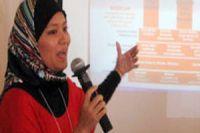(Ahlul Bayt News Agency) - Filipino Muslim lawmakers have been pushing for a new law to protect women’s right to don the Islamic headscarf, or hijab, to ensure veiled women protection against discriminatory institutions or entities.
“We will try to convince other (non-Muslim) members of the House to support its passage,” Anak Mindanao Representative Sitti Djalia Hataman told Inquirer Mindanao on Monday, February 3.
According to Hataman, House Bill 659, entitled “The Equal Protection Act”, was filed to ensure that institutions, entities, establishments and organizations would not discriminate against the use of hijab.
The proposed law was suggested by Hataman, wife of Autonomous Region in Muslim Mindanao Governor Mujiv Hataman, after she herself experienced humiliation for donning hijab.
She recalled her bitter experience during a forum marking World Hijab Day held last Saturday at the Shariff Kabunsuan Cultural Center.
Hataman broke down as she recalled a humiliating occasion where she and her husband, then congressman Mujiv, were barred from a venue unless she removed her head cover.
She asserted that the unforgettable experience made her faith stronger, and when she was elected party-list representative, she openly declared the wearing of the head cover or scarf by women as her political statement and that Muslim women should not be ashamed of it.
Presenting the new law, Hataman said she was overjoyed that the proposed measure got the support of Muslim lawmakers.
Muslims make up nearly 8 percent of the total populace in the largely Catholic Philippines.
The mineral-rich southern region of Mindanao, Islam's birthplace in the Philippines, is home to 5 million Muslims.
Islam reached the Philippines in the 13th century, about 200 years before Christianity.
Islam sees hijab as an obligatory code of dress, not a religious symbol displaying one’s affiliations.
On February 1, one million Muslim and non-Muslim women donned Islamic head scarf in almost 116 countries to mark the second anniversary of World Hijab Day.
The event, held for the second consecutive year, was first suggested by New York Muslim woman Nazma Khan to encourage non-Muslim women to don the hijab and experience it.
It was designed as part of a bid to foster better understanding and counteract controversies surrounding hijab as a Muslim choice. a
/149
“We will try to convince other (non-Muslim) members of the House to support its passage,” Anak Mindanao Representative Sitti Djalia Hataman told Inquirer Mindanao on Monday, February 3.
According to Hataman, House Bill 659, entitled “The Equal Protection Act”, was filed to ensure that institutions, entities, establishments and organizations would not discriminate against the use of hijab.
The proposed law was suggested by Hataman, wife of Autonomous Region in Muslim Mindanao Governor Mujiv Hataman, after she herself experienced humiliation for donning hijab.
She recalled her bitter experience during a forum marking World Hijab Day held last Saturday at the Shariff Kabunsuan Cultural Center.
Hataman broke down as she recalled a humiliating occasion where she and her husband, then congressman Mujiv, were barred from a venue unless she removed her head cover.
She asserted that the unforgettable experience made her faith stronger, and when she was elected party-list representative, she openly declared the wearing of the head cover or scarf by women as her political statement and that Muslim women should not be ashamed of it.
Presenting the new law, Hataman said she was overjoyed that the proposed measure got the support of Muslim lawmakers.
Muslims make up nearly 8 percent of the total populace in the largely Catholic Philippines.
The mineral-rich southern region of Mindanao, Islam's birthplace in the Philippines, is home to 5 million Muslims.
Islam reached the Philippines in the 13th century, about 200 years before Christianity.
Islam sees hijab as an obligatory code of dress, not a religious symbol displaying one’s affiliations.
On February 1, one million Muslim and non-Muslim women donned Islamic head scarf in almost 116 countries to mark the second anniversary of World Hijab Day.
The event, held for the second consecutive year, was first suggested by New York Muslim woman Nazma Khan to encourage non-Muslim women to don the hijab and experience it.
It was designed as part of a bid to foster better understanding and counteract controversies surrounding hijab as a Muslim choice. a
/149

